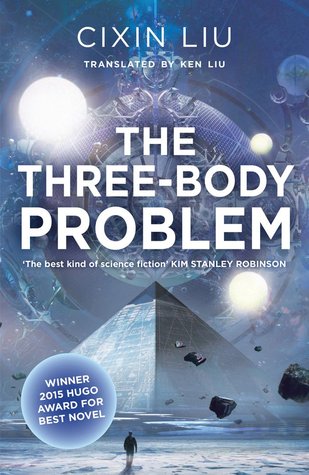Daniel a publié une critique de The Three-Body Problem par Cixin Liu (Three-Body Trilogy, #1)
How to hack a proton
3 étoiles
This was a little too weird for me and I can’t say I really bought the premise of the story fully…

Paperback, 434 pages
Langue : English
Publié 12 septembre 2016 par Head of Zeus.
1967: Ye Wenjie witnesses Red Guards beat her father to death during China's Cultural Revolution. This singular event will shape not only the rest of her life but also the future of mankind.
Four decades later, Beijing police ask nanotech engineer Wang Miao to infiltrate a secretive cabal of scientists after a spate of inexplicable suicides. Wang's investigation will lead him to a mysterious online game and immerse him in a virtual world ruled by the intractable and unpredictable interaction of its three suns.
This is the Three-Body Problem and it is the key to everything: the key to the scientists' deaths, the key to a conspiracy that spans light-years and the key to the extinction-level threat humanity now faces.
1967: Ye Wenjie witnesses Red Guards beat her father to death during China's Cultural Revolution. This singular event will shape not only the rest of her life but also the future of mankind.
Four decades later, Beijing police ask nanotech engineer Wang Miao to infiltrate a secretive cabal of scientists after a spate of inexplicable suicides. Wang's investigation will lead him to a mysterious online game and immerse him in a virtual world ruled by the intractable and unpredictable interaction of its three suns.
This is the Three-Body Problem and it is the key to everything: the key to the scientists' deaths, the key to a conspiracy that spans light-years and the key to the extinction-level threat humanity now faces.
This was a little too weird for me and I can’t say I really bought the premise of the story fully…
Avertissement sur le contenu This book is intensely political.
Everyone loves this, but I can't understand why nobody seems to be put off, or at least puzzled, but the way that every human individual or organization in the book is just relentlessly awful, ranging from suicidal to genocidal, and everything in-between, without respite.
Most of them, given any chance at all, are trying hard to selfishly save their own skins, with not a moment's regard for the fact that their plans will immediately doom the rest of the human race. Those not intent on self preservation at any cost are instead committed to bitter nihilism, such as the ultimate eco-terrorists, who feel that to save the Earth's biosphere they must collaborate with alien forces to bring about humanity's defeat, and likely annihilation.
These characters and groups are not depicted as outliers. They represent the human race in its entirety. The only thing that holds back this tide of destructive behavior is the government, who keeps everyone in line.
I can't tell how much of this bizarrely one-sided depiction of humanity is a deliberate choice by the author, versus simply being an unplanned exposure of their worldview, shaped as it is by their native Chinese immersion in authoritarianism. Does that form a subconscious backdrop to everything they wrote here, or are they consciously making a deliberate point that strong government is absolutely necessary?
The author Liu Cixin has since gone on record in support of the Chinese government's internment of Muslim Uighurs in Xinjiang. There, people have been rounded up, because of their ethnicity, into over 400 internment camps. The camps administer cultural and religious re-education, forced labor, involuntary sterilization and abortion. This is something Liu Cixin is openly in favor of.
It makes my skin crawl to read that, and then carry on blithely with this story book of theirs, which seems to be an unapologetic justification for an authoritarian government's impositions on its populate. I did finish it, but have no desire to read the sequels - and not just because I don't agree with the politics. I genuinely found the behavior of all the characters to be intrusively bewildering, demented and incessantly frustrating.
Spannend aufgebaut mit verschiedenen Handlungssträngen, die sich irgendwann zusammenfügen. Technische / physikalische Grundprinzipien auch für mich als Laien verständlich dargestellt. Und die Frage nach dem "First Contact" mit all ihren Implikationen wurde toll beackert. Zusätzlich erfährt von noch etwas über die jüngere chinesische Geschichte.
Spannend aufgebaut mit verschiedenen Handlungssträngen, die sich irgendwann zusammenfügen. Technische / physikalische Grundprinzipien auch für mich als Laien verständlich dargestellt. Und die Frage nach dem "First Contact" mit all ihren Implikationen wurde toll beackert. Zusätzlich erfährt von noch etwas über die jüngere chinesische Geschichte.
A good hard fiction novel that explores the question of making first contact. It's a quick read that has decent character development, a smooth flowing plot, and asks deep philosophical science questions.
A good hard fiction novel that explores the question of making first contact. It's a quick read that has decent character development, a smooth flowing plot, and asks deep philosophical science questions.
Ich hab innerhalb von zwei Tagen "Die Drei Sonnen" von Cixin Liu gelesen. Das hatte ich schon sehr lange auf meiner Liste und erfreulicherweise waren alle drei Bände der Trilogie in der Stadtbücherei vorrätig.
Die knapp 550 Seiten haben sich schnell und angenehm gelesen. Das Meisterwerkgefühl bliebt bei mir jedoch leider aus.
Die Geschichte ist nett, aber jetzt nichts neues, vieles wirkt eher konstruiert und anstatt Entdeckung wird eher präsentiert.
Ich hab innerhalb von zwei Tagen "Die Drei Sonnen" von Cixin Liu gelesen. Das hatte ich schon sehr lange auf meiner Liste und erfreulicherweise waren alle drei Bände der Trilogie in der Stadtbücherei vorrätig.
Die knapp 550 Seiten haben sich schnell und angenehm gelesen. Das Meisterwerkgefühl bliebt bei mir jedoch leider aus.
Die Geschichte ist nett, aber jetzt nichts neues, vieles wirkt eher konstruiert und anstatt Entdeckung wird eher präsentiert.